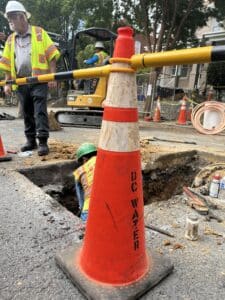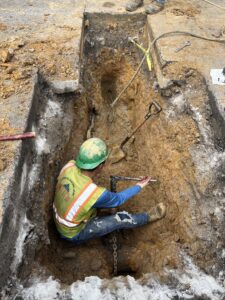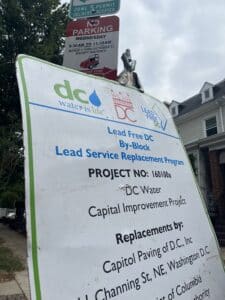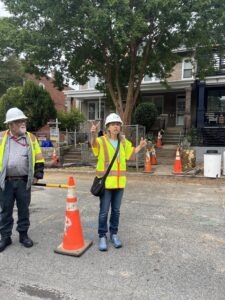Highlights from the Lead Service Line Collaborative’s DC Meeting
 As a member organization of the Lead Service Line Replacement Collaborative, ASDWA staff attended a meeting to discuss new initiatives for the collaborative and visited a lead service line (LSL) replacement project site with DC Water.
As a member organization of the Lead Service Line Replacement Collaborative, ASDWA staff attended a meeting to discuss new initiatives for the collaborative and visited a lead service line (LSL) replacement project site with DC Water.
On site, two crews of four worked to replace three LSLs on one street in Washington, DC. At this particular site the LSLs were left in place, with a new copper pipe pulled through a parallel boring to reconnect to the private-side service line (which was already copper). A single crew can complete one or two replacements per day. Because of the soil, crews cannot complete replacements in the rain. During a replacement, water is shut off for approximately one hour, and afterwards, customers are provided a filter (including instructions for use) to ensure they are not exposed to any lead that may have been released as a part of the replacement.  
The LSL Replacement Collaborative meeting started with a look back at how the LSLRC has advanced strategic priorities over the last two years. Building on these accomplishments, collaborative members discussed future strategies and initiatives. Recognizing that the work is far from over, attendees brainstormed innovative approaches to accelerate LSL replacement efforts nationwide, including strategies to better connect with customers and sharing resources with small and disadvantaged communities.
One of the highlights of the meeting was a presentation by Denver Water, which shed light on the importance of supporting soft skills in the LSL replacement workforce. Field staff play a pivotal role in ensuring that the replacement process is not only technically sound but also carried out with empathy and respect for residents. Denver Water’s training programs, which focus on customer relations, de-escalation techniques, and other interpersonal skills, serve as a model for engaging the human side of LSL replacement.
 During the meeting, collaborative members learned about the mission of the Justice40 Accelerator. This organization’s mission, centered on achieving environmental and economic justice by bringing together and providing technical assistance to community organizations advancing the Justice40 initiative, aligns closely with the goals of the LSL Replacement Collaborative. Discussions revolved around how the collaborative can leverage the lessons learned from the Justice 40 Accelerator, forge new partnerships, and offer additional resources to communities disproportionately affected by lead contamination.
During the meeting, collaborative members learned about the mission of the Justice40 Accelerator. This organization’s mission, centered on achieving environmental and economic justice by bringing together and providing technical assistance to community organizations advancing the Justice40 initiative, aligns closely with the goals of the LSL Replacement Collaborative. Discussions revolved around how the collaborative can leverage the lessons learned from the Justice 40 Accelerator, forge new partnerships, and offer additional resources to communities disproportionately affected by lead contamination.
The LSL Replacement Collaborative meeting provided an excellent opportunity to reflect on past accomplishments and chart a course for the future. The site visits to lead service line replacement projects in D.C. highlighted the tangible impact of the collaborative’s work and insights from Denver Water and the Justice40 Accelerator mission underscored the importance of not only technical solutions but also the human element in addressing the LSL challenge.
States continue to await the Lead and Copper Rule Improvements (LCRI), which is currently under review by the president’s Office of Management and Budget and is expected to prioritize LSL replacements. To learn more about the comment process for the LCRI, register for EPA’s webinar on Engaging in the LCRI Regulatory Process on October 17th. To learn more about lessons learned from water system’s LSL inventory efforts, register now for ASDWA’s free webinar on October 16th, T-Minus 12 Months: Lessons Learned and Information Gaps for Initial LSL Inventories.

